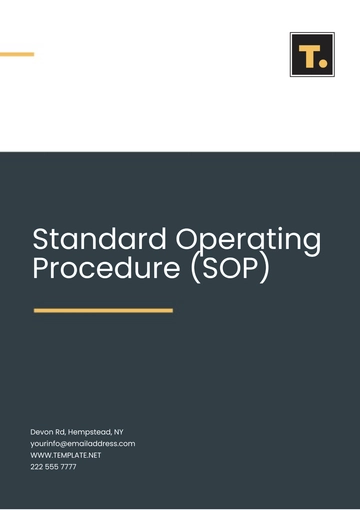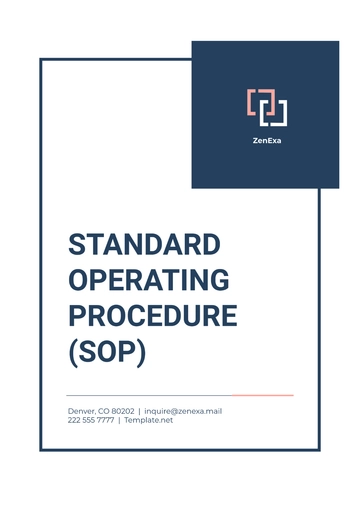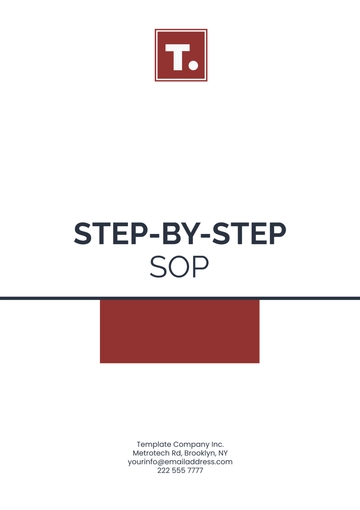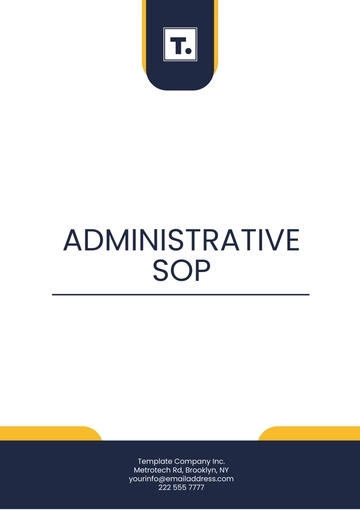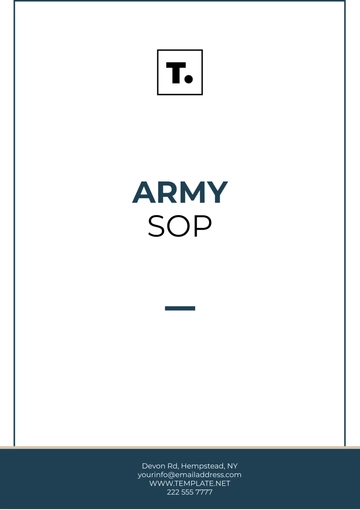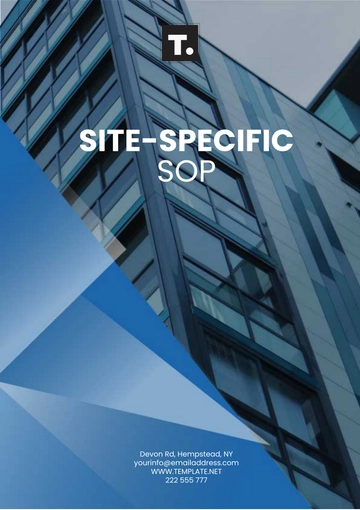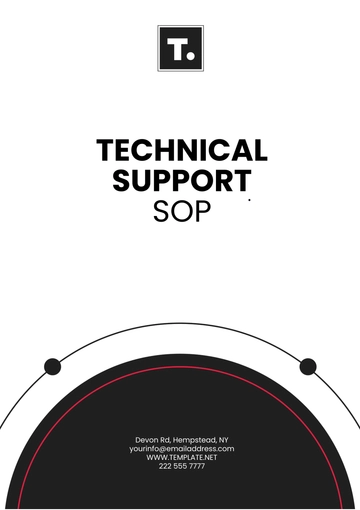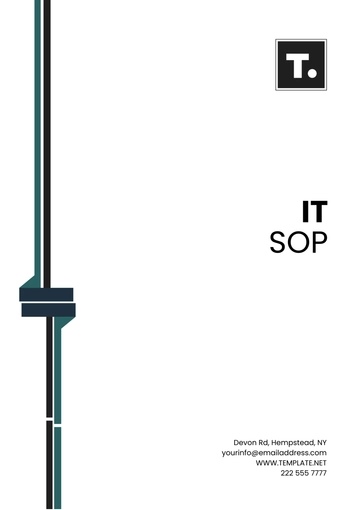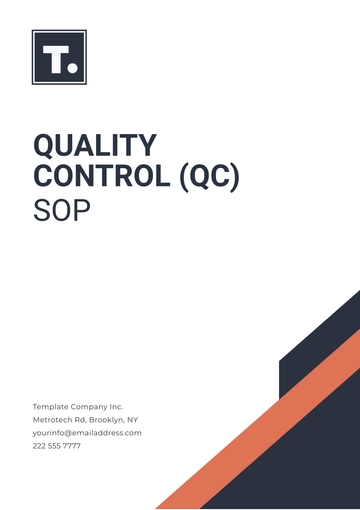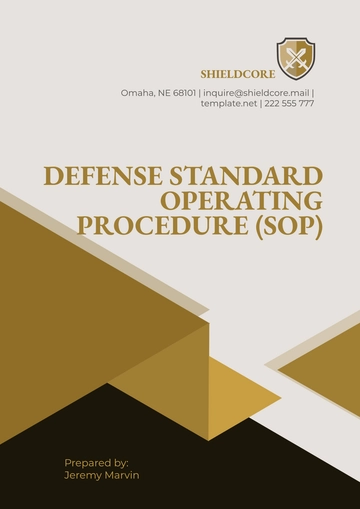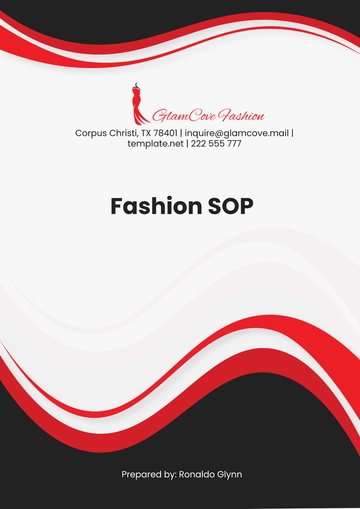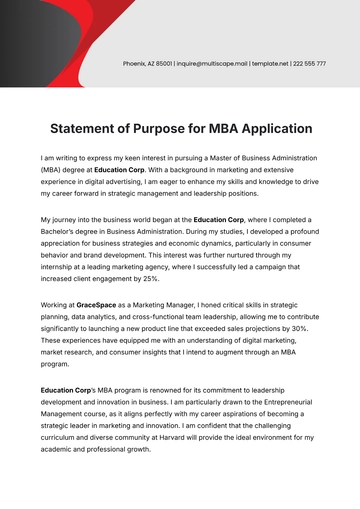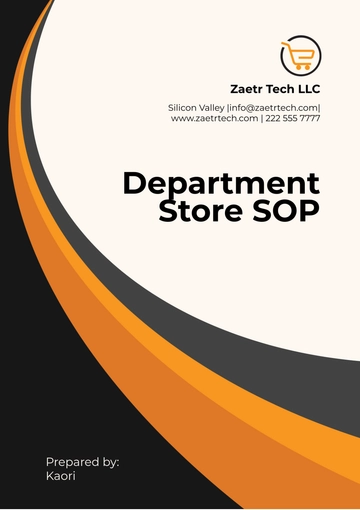Free Standard Sales Training SOP
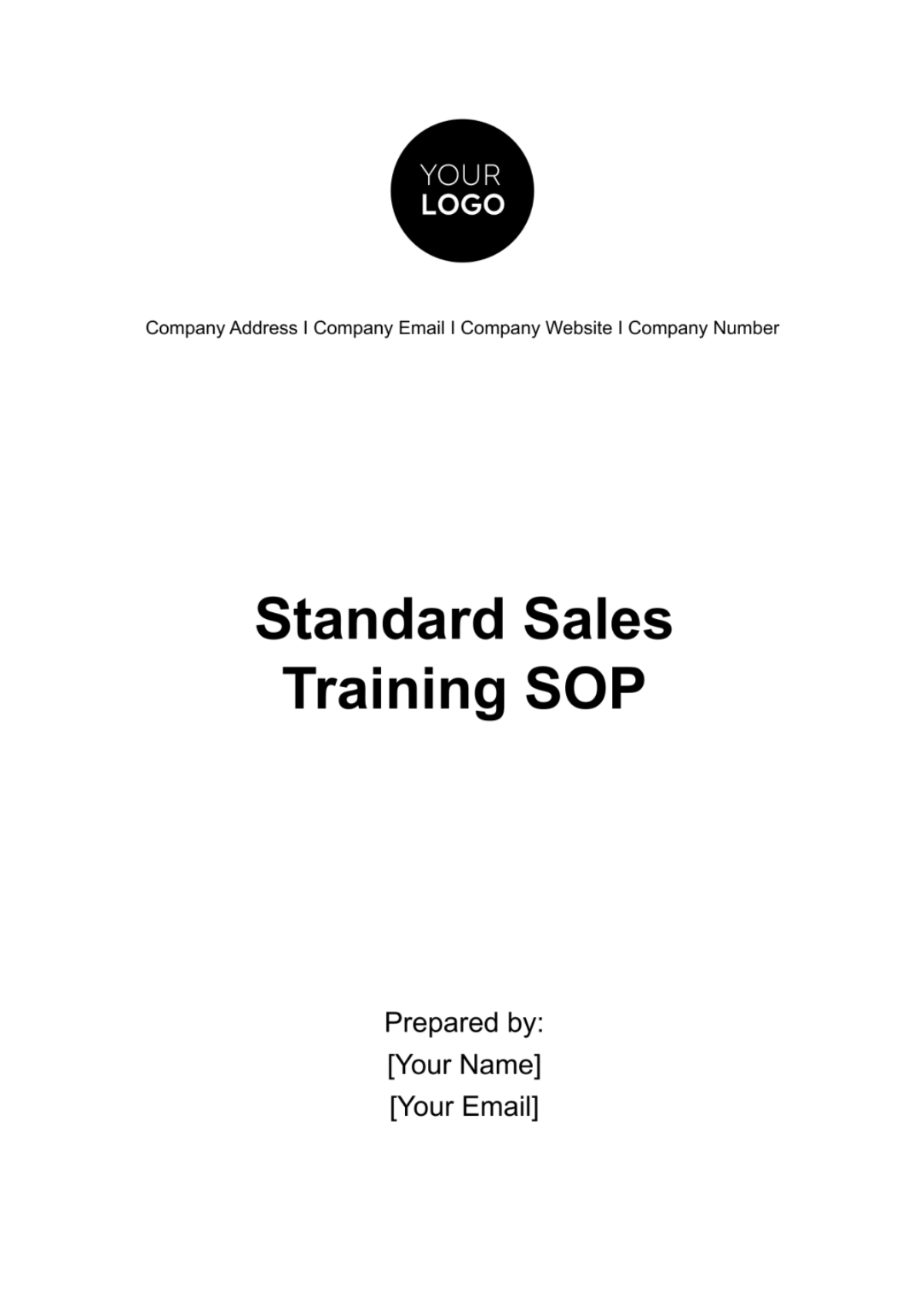
Introduction
Sales training is a vital component of any successful organization, equipping sales representatives with the knowledge and skills they need to excel in a highly competitive market. [Your Company Name], a leading technology company, places a strong emphasis on empowering its salesforce with comprehensive training programs. This Standard Sales Training Standard Operating Procedure (SOP) serves as a guide to ensure consistency and effectiveness in our sales training processes.
Purpose
The purpose of this SOP is to provide a clear framework for [Your Company Name]'s sales training, ensuring that all sales representatives are equipped with the knowledge, skills, and tools necessary to meet and exceed sales targets while representing our brand with professionalism and integrity.
Scope
This SOP covers the following key areas of sales training at [Your Company Name]:
Onboarding and Orientation
Product Knowledge
Sales Techniques and Strategies
Customer Relationship Management
Sales Technology Tools
Performance Metrics and Assessment
Onboarding and Orientation
The onboarding and orientation phase is crucial in integrating new sales representatives into [Your Company Name], setting the foundation for their success and alignment with our corporate ethos.
New Hire Orientation:
Upon joining [Your Company Name], all new sales representatives will participate in a comprehensive orientation program. During orientation, new hires will learn about the company's history, mission, values, and culture. They will also receive an overview of the sales department's structure and their role within it.
Company Policies and Code of Conduct:
New hires will be introduced to [Your Company Name]'s policies and code of conduct. They will learn about ethical selling practices, confidentiality, and compliance with industry regulations.
Product Knowledge
To ensure our sales team is equipped with a comprehensive understanding of [Your Company Name]'s offerings, we delve beyond basic product features and benefits. This section introduces advanced modules aimed at deepening product insights and market context, essential for sophisticated sales dialogues.
Product Training:
Sales representatives must have a deep understanding of [Your Company Name]'s products and services. Regular training sessions will cover product features, benefits, use cases, and competitive advantages. Practical product demonstrations will be a part of these sessions.
Competitive Analysis:
Sales representatives will be trained to understand and analyze competitor products, enabling them to position [Your Company Name] products effectively. This includes training on identifying unique selling points and differentiators.
Advanced Product Insights:
In addition to foundational product knowledge, [Your Company Name] will provide sales representatives with advanced insights into the technological underpinnings, development processes, and future roadmap of our products and services. This deeper understanding will empower them to convey the long-term value and innovation trajectory to potential clients.
Market Trends and Insights:
Regular updates on industry trends, market demands, and consumer behavior patterns will be integrated into the training curriculum. This knowledge will enable sales representatives to contextualize [Your Company Name]'s offerings within the larger market landscape, enhancing their ability to sell effectively.
Sales Techniques and Strategies
Mastering diverse sales methodologies and strategies is fundamental to navigating the complexities of modern sales environments. This section focuses on refining our sales approach with adaptive strategies and technological proficiencies for maximized effectiveness.
Sales Methodology:
[Your Company Name] will implement a standardized sales methodology, such as SPIN Selling or Challenger Sales. Sales representatives will be trained in the chosen methodology to improve their approach in various sales situations.
Sales Skills Development:
Training sessions will focus on developing key sales skills, including prospecting, objection handling, closing techniques, and negotiation. Role-playing exercises and real-world scenarios will be used to reinforce these skills.
Strategic Positioning:
Training will include sessions on strategic market positioning, focusing on how [Your Company Name]'s products stand in relation to emerging market trends and competitor strategies. This will prepare sales representatives to articulate a compelling narrative around the strengths and future potential of our offerings.
Competitor Monitoring Techniques:
Sales representatives will be equipped with techniques and tools for ongoing competitor monitoring. This will include analysis of competitor marketing strategies, product updates, and market positioning, ensuring our team maintains an edge in rapidly evolving market conditions.
Customer Relationship Management
At the heart of sustained business success is the ability to foster and maintain robust customer relationships. This section advances our commitment to customer-centric sales practices, focusing on long-term customer success and actionable feedback mechanisms.
Customer-Centric Approach:
Sales representatives will be trained to adopt a customer-centric approach. This includes actively listening to customer needs, asking probing questions, and providing tailored solutions.
Building Rapport:
Sales training will emphasize building strong relationships with customers. This involves trust-building, effective communication, and empathy. Sales representatives will also be trained in networking and maintaining long-term relationships.
Customer Success Focus:
Beyond initial sales, training will emphasize the importance of contributing to customer success. This includes understanding and advocating for customer needs within [Your Company Name], ensuring product and service delivery aligns with their goals and expectations.
Feedback Loops and Continuous Improvement:
Sales representatives will be trained in establishing effective feedback loops with customers. This will involve techniques for gathering, analyzing, and acting on customer feedback to drive continuous product improvement and foster long-term customer loyalty.
Sales Technology Tools
This section is dedicated to equipping our sales team with knowledge and proficiency in utilizing state-of-the-art sales technology tools. These tools are designed to streamline sales operations, enhance customer engagement, and significantly improve the efficiency and effectiveness of our sales strategies.
CRM Systems | [Your Company Name] uses a state-of-the-art Customer Relationship Management (CRM) system. Sales representatives will receive extensive training on using the CRM for lead management, pipeline tracking, and reporting. |
Sales Tools and Resources | Sales representatives will be trained on using various sales tools and resources, such as email marketing platforms, online presentation software, and social media for sales prospecting and engagement. |
Sales Pipeline Monitoring | Our CRM enables real-time monitoring of the sales pipeline. Sales representatives will be trained to use pipeline data to predict revenue, spot bottlenecks, and take proactive actions to keep deals moving smoothly through the sales process. |
Customer Data Insights | Effective use of the CRM system also includes understanding customer data and deriving valuable insights. Sales representatives will be taught how to leverage this data to personalize interactions, anticipate customer needs, and enhance the overall customer experience. |
Sales Tools and Resources:
In addition to the CRM system, [Your Company Name]provides a suite of sales tools and resources aimed at empowering our sales representatives to work smarter, not harder.
Email Marketing Platforms:
Email marketing remains a powerful tool in a sales representative's arsenal. Training will focus on how to craft compelling, personalized email campaigns, leverage automation to nurture leads, and track the effectiveness of email outreach.
Online Presentation Software:
In a digital age, sales presentations have transitioned to online platforms. Sales representatives will be schooled in using online presentation software to create captivating, interactive presentations that engage prospects and convey the value of [Your Company Name]'s products and services.
Social Media for Sales Prospecting and Engagement:
Incorporating social media into the sales process is vital in today's interconnected world. Sales representatives will be trained in social selling strategies, which involve leveraging platforms like LinkedIn, Twitter, and even industry-specific forums to identify leads, build relationships, and foster meaningful conversations with potential customers.
Sales Collateral Management:
Managing sales collateral, such as product brochures, whitepapers, and case studies, efficiently is crucial. Sales representatives will learn how to access, customize, and distribute these materials to provide prospects with the most relevant information at the right time.
Sales Analytics and Reporting:
Training will also cover the use of analytics tools and reporting platforms to track the effectiveness of sales efforts. Sales representatives will be taught how to analyze metrics, identify trends, and adjust their strategies accordingly to maximize sales outcomes.
Performance Metrics and Assessment
Understanding and mastering KPIs is essential for sales representatives to gauge their performance and navigate the path to success effectively. [Your Company Name] utilizes a well-defined set of KPIs to assess and improve sales performance.
Revenue and Sales Targets:
Sales representatives will receive training on how to set, track, and meet revenue and sales targets. These targets are not just numbers; they represent the company's goals and are the foundation of sales success.
Conversion Rates:
The conversion rate is a critical KPI, measuring the efficiency of the sales process. Training will emphasize strategies for improving conversion rates, including effective lead qualification and objection handling.
Sales Cycle Length:
Understanding the sales cycle and learning how to manage it effectively is vital. Sales representatives will be taught to identify bottlenecks and strategies to shorten the sales cycle, thus accelerating revenue generation.
Average Deal Size
The average deal size indicates the quality of sales efforts. Training will cover techniques to increase deal sizes through upselling and cross-selling, ultimately contributing to revenue growth.
Customer Acquisition Costs
Sales representatives will be made aware of the financial implications of customer acquisition. Training will focus on optimizing sales efforts to minimize customer acquisition costs while maximizing returns.
Continuous Assessment
Sales training is not a one-time event; it's a continuous journey of learning and improvement. To facilitate this, [Your Company Name] implements a rigorous assessment process designed to identify areas of growth and development.
Quizzes and Examinations | Regular quizzes and examinations will be used to assess sales representatives' understanding of product knowledge, sales methodologies, and company policies. Feedback from these assessments will guide further training. |
Mock Sales Calls and Role-Playing | Role-playing exercises help sales representatives practice real-world scenarios. These exercises will be a part of ongoing training to develop and refine critical sales skills, including objection handling and negotiation. |
Peer Evaluations | Peer evaluations encourage sales representatives to learn from each other. Periodic assessments by colleagues provide insights into performance from a different perspective and foster a culture of teamwork and mentorship. |
Sales Performance Reviews | Regular performance reviews with sales managers will be conducted to provide personalized feedback and set goals for improvement. These reviews serve as opportunities for constructive discussions on individual strengths and areas for growth. |
Individual Development Plans | Based on performance assessments and feedback, sales representatives will work with their managers to create individual development plans. These plans outline specific actions, training, and resources needed to achieve sales targets. |
Sales training at [Your Company Name] is not a one-time event but a continuous journey of growth and development. Ongoing training ensures that sales representatives are continually equipped with the latest knowledge and skills needed to excel in their roles. The following suggestions are listed below:
Training | Frequency | Description |
Role-playing Part 2 | Monthly | Have the trainees practice with each other once again. |
Conclusion
Effective sales training is a cornerstone of [Your Company Name]'s success in the competitive technology industry. This Standard Sales Training SOP provides a framework to ensure that all sales representatives receive the necessary training and support to excel in their roles. By following this SOP, [Your Company Name] aims to maintain a high level of professionalism, integrity, and success in its sales efforts. With a focus on onboarding, product knowledge, sales techniques, customer relationship management, and technology tools, [Your Company Name] can ensure that its sales representatives are well-prepared to meet and exceed their sales targets.
- 100% Customizable, free editor
- Access 1 Million+ Templates, photo’s & graphics
- Download or share as a template
- Click and replace photos, graphics, text, backgrounds
- Resize, crop, AI write & more
- Access advanced editor
Streamline your sales training process with this Standard Sales Training SOP Template. Available on Template.net, it provides a comprehensive, customizable structure, ensuring all training aspects are covered effectively. Editable in our Ai Editor Tool, this template allows for easy adjustments to fit your unique training standards.
